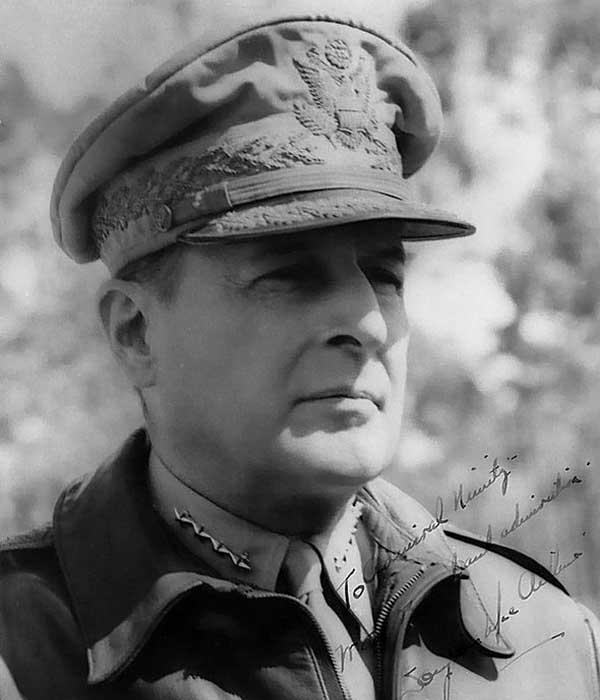Today's Birthday
Douglas MacArthur1880–1964, American General.

American general, b. Little Rock, Ark.; son of Arthur MacArthur.
Early Career
MacArthur was reared on army posts and attended military school in Texas. At West Point he achieved an outstanding scholastic record, and after graduation (1903) he served in the Philippines and in Japan. He was (1906–7) aide to President Theodore Roosevelt, a friend of his father, and was attached (1913–17) to the army general staff. After the United States entered World War I he fought in France, first as chief of staff of the 42d (Rainbow) Division and then, having been promoted (June, 1918) to brigadier general, as commander of the 84th Infantry Brigade.
As superintendent of West Point (1919–22) he helped modernize the academy's military training program. After holding various commands (1922–25) in the Philippines, he returned to the United States and served (1925) on the court-martial of Gen. William Mitchell. He was (1928–30) department commander in the Philippines and then served (1930–35) as chief of the general staff. In 1932 he provoked much criticism by personally commanding the troop action that evicted the Bonus Marchers from Washington. In the tense and threatening days of Japanese expansion President Franklin Delano Roosevelt appointed (1935) MacArthur head of the American military mission to the new Philippine Commonwealth. Accepting command of the Philippine military establishment, he retired (1937) from the U.S. army, but later returned to duty (July, 1941) to command U.S. armed forces in East Asia.
World War II
After the Japanese attack on Pearl Harbor on Dec. 7, 1941, MacArthur commanded the defense of the Philippines until March, 1942, when, under the orders of President Roosevelt, he left for Australia to take command of Allied forces in the Southwest Pacific. From Australia he launched the New Guinea campaign and later (Oct., 1944–July, 1945) directed the campaigns that led to the liberation of the Philippines. He was promoted (Dec., 1944) to the new rank of general of the army (five-star general). MacArthur accepted the surrender of Japan on the U.S.S. Missouri on Sept. 2, 1945. He was then named commander of the Allied powers in Japan and directed the Allied occupation of Japan. He was seriously considered for the Republican presidential nomination in 1948, but his defeat in the Wisconsin state primary discouraged his supporters.
The Korean War and After
At the beginning (1950) of the Korean War he was appointed commander of UN military forces in South Korea, while retaining his command of Allied forces in Japan. After driving the North Korean forces back over the 38th parallel, MacArthur received President Truman's permission to press into North Korea and advance all the way to the Yalu River—the border between North Korea and Communist China—despite warnings that this might provoke Chinese intervention. When China did intervene, causing the UN forces to fall back in disarray, MacArthur pressed for permission to bomb Chinese bases in Manchuria. Truman refused such permission and finally (after MacArthur had made the dispute public) removed him from command in April, 1951.
On his return to the United States, MacArthur was given a hero's welcome and invited to address a joint session of Congress. Another attempt to nominate MacArthur for the presidency was unsuccessful in 1952. Retired from active service, he became an officer of a large business corporation.
Bibliography:
See biographies by D. C. James (Vol. I, 1970) and Norman Finkelstein (1989); studies by Courtney Whitney (1956), J. W. Spanier (1959, repr. 1965), G. M. Long (1969), and James Clayton (1985).
Who2. Copyright © 1998-2006 by Who2?, LLC. All rights reserved.
Also Born on January 26
- Charles XIVking of Sweden and Norway (1763)
- Bessie Colemanaviator (1893)
- Paul Newmanactor (1925)
- Jules Feiffercartoonist and writer (1927)
- Angela Davisactivist (1944)
- David Strathairnactor (1949)
- Ellen DeGenerescomedienne, actress (1958)
- Wayne Gretzkyhockey player (1961)
Who Shares Your Birthday?
The Day You Were Born
The Year You Were Born











